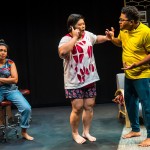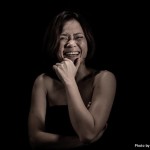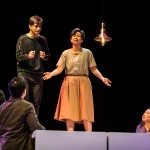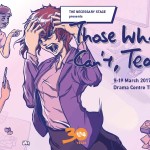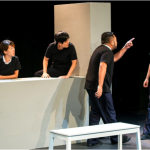“Civilised“
Reviewer: Jocelyn Chng
Performance: 16 May 2019
“Tear up the maps” – this line is repeated many times during one segment of the play, as well as printed on the front page of the programme. It is an incitement to an inherently violent act, of metaphorically re-claiming one’s land and rights that have been wrongfully claimed. But the play is not naïve enough to suggest that such an act would be effective; it does quite the opposite, highlighting the futility of trying to decolonise in today’s dark times.
Following on the heels of another play, Miss British (part of the Esplanade’s The Studios series this year), which also deals with a similar topic, Civilised makes a clear point of understanding the idea of colonisation in the broadest senses of the word. I use “senses” in plural because here colonisation is understood not only in the narrow sense of Western European colonialism in the 15th to 19th centuries, but also in the myriad contemporary contexts where one culture oppresses another. In particular, the play examines marginalised communities, deeply entrenched power structures, and capitalist production systems that cause suffering for those at the bottom of the chain.
The play opens with the five cast members asking the audience what they consider “civilised” versus “uncivilised”. Big red books are passed around, in which audience members can write their suggestions. The performance moves quickly in the early segments. Before I have time to fully process this dichotomy, we are bombarded with an assortment of references to colonisation, past and present, that it is all quite overwhelming.
The play is divided into sections, each with a subtitle. One image from “Part 2: Colonisation Present” remains in my head – a troubling image that raises complex issues. A yoga teacher (Lian Sutton) exhorts his student (Koh Wan Ching) to “align your spine”, speaking in an exaggerated meditative voice, complete with clichéd spiritual mumbo-jumbo like “be in the present”. This on its own would be comedic, but at the same time, at the other end of the traverse stage, another cast member (Ghafir Akbar) lies on his side in the nude, facing away from the audience, shouting tirades about the violence currently going on in the world. This juxtaposition is powerful and disturbing. On one level, the commercial practice of yoga by many Western practitioners today can itself be seen as a form of colonisation. But also, if this is “the present”, as embodied by Ghafir, I struggle with exactly how one can “be in the present” yet remain calm with a clear conscience.
As the play moves into the later sections, the sense of futility of the whole idea of decolonisation becomes more apparent. I don’t believe the play actually says anything entirely new; however, it says things that need to be said, especially in this year of the Singapore Bicentennial. Indeed, this question is asked point-blank: which other country would celebrate the anniversary of their being colonised?
At one point, the cast debates how far it would be possible to “decolonise” in terms of the language that we speak – English is the language of our colonisers, but also the common language that provides some unity and ease of communication between different cultural groups. Ghafir indignantly starts speaking in Malay and declares that he will do so for the rest of the performance, although he caves and goes back to speaking English by the next section. I almost wish he had stuck to his guns, even though I would not have been able to understand him. After all, aren’t plurality and diversity, and all their accompanying messiness, what the play encourages us to fight for?
Do you have an opinion or comment about this post? Email us at info@centre42.sg.
ABOUT THE PRODUCTION
CIVILISED by The Necessary Stage
15 – 26 May 2019
The Necessary Stage Black Box
ABOUT THE REVIEWER
Jocelyn holds a double Masters in Theatre Studies/Research. She is a founding member of the Song and Dance (SoDa) Players – a registered musical theatre society in Singapore. She is currently building her portfolio career as an educator and practitioner in dance and theatre, while pursuing an MA in Education (Dance Teaching).

